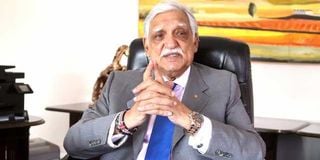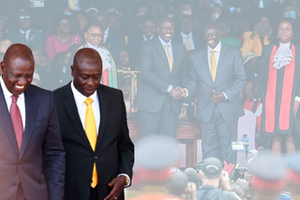Nizar Juma on the satisfaction of just walking away from it all

Nizar Juma - founder of The Blue Company Initiative during an interview at his office in Nairobi on Monday, November 8, 2021.
What you need to know:
- He once owned the Adidas franchise that supplied balls to the 1978 World Cup.
- There was a time when he was on boards of almost 80 companies.
For over 30 years, he has been waking up at 4am, braving Nairobi’s traffic snarl-ups to and from work without pay. Twenty of those years have been spent at the Jubilee Holdings boardroom, where he has been exuding what he calls soft power.
Nizar Juma, who hit 80 in April, talks about the shift from chasing success to following satisfaction and what it took to pick up from losing his marriage in the midst of making money, drinking alcohol, smoking, and partying six days a week.
He once owned the Adidas franchise that supplied balls to the 1978 World Cup and even earned himself accolades from the then President Daniel arap Moi. He walked away from it all—all in search of inward peace and satisfaction.
You have been the face of Jubilee Holdings for the past two decades. Why the decision not to offer yourself for another term as chairman?
There comes a time when you have to stop. I think 20 years is a long time, and I believe we have done good work and reached a stage where this company will continue even when I leave. It has a very strong base and I think others will take it forward. We have to give others a chance because people may be looking at me and saying, “Same guy again!” I consider that the work I have done in the insurance industry has been a service and I am glad that I have done this as a volunteer. I have not done this for money. We do nearly everything for money and it is good when we can do some things for reasons beyond money.
This sounds surprising, in 1992, you closed all your businesses and started working for free…
What I needed to do for money, I have done. Now I am not starving. I have enough to live (on). And so, around 1992, I stopped following money for money. I know all my children are well off, and they are doing their own things. Twenty is enough.
There was a time I was on boards of almost 80 companies but I have been slowing down. I will give up on practically all the companies. My intention is that, slowly, over a couple of years, I want to give up, except for initiatives that are purely for the welfare of people.
You mentioned that there comes a time when one has to stop. How do you know it is time to stop?
The time comes when you think you want to do more and more for pure welfare. That is why initiatives such as Future of Power and Blue Company are closest to my heart.
Under the Future of Power, we are telling people like me who have been CEOs and chairpersons of large companies to bring soft power to what they do, not thumping tables, being loud, and forcing people to do things.
Today, more and more top CEOs are using their soft power to build powerful companies.
This is what the future is all about. Blue Company comes out of soft power. It stresses running companies without corruption.
In April, you turned 80 years old. What does 80 mean to you?
What does 80 mean to me? It is an age. But to a lot of people, they say, “Uuuh! 80! It is a big number,” but when you are going through the process, it is just a number. Fortunately, for as long as your senses are all there, then it is good but you become a little bit softer.
My initiative on soft power comes with age as well. You want to do things which are substantially beneficial to people. That is what is important now. Everything I do from now on, I think about what is going to be the effect. Am I going to do any harm to anybody? Am I just going to encourage profit-making?
Looking at your assignments over time, which has been the most satisfying and why?
I have left a mark in many companies, including Aga Khan University Hospital, DTB and Jubilee, but this soft power is what I have enjoyed the most. We started this in 2009, and we have done this programme in 72 cities all over the world including in America, Australia, the Philippines, and India.
Each country where we have done the programme has wanted more. In the Philippines, there was a head of police who said, “You come, I will pay all your expenses to come and do this programme,” but I said no. I told him to do the programme with our support. And he did it. That is exciting.
A shift from boardrooms to what you want to pursue looks equally tasking …
It is tasking but more satisfying. If Jubilee makes Sh8 billion or Sh12 billion, to me, it is good because somebody says, “Well done!” and my shareholders are happy.
But personal satisfaction comes from something like Blue Company because in an environment of so much corruption, if you can make even a difference of one percent it is worthwhile. This is worth spending the rest of my life on. Soft power is something I want to continue doing and I hope to reach 100 (years) soon.
What does it take to keep your energy levels up at this age?
I am a meditator. Every morning I am up at 4am, at 4.45am, it is my time for meditating. This keeps me stable. I never accept evening meetings or dinners. If anybody invites me for dinner, I make it clear that I prefer lunch. There have to be certain rules that one has to live by.
What kind of freedom have you enjoyed by not taking a salary since 1992?
Total. Total. This is my power. When I stand in front of my shareholders in Jubilee, for example, I know I am not taking anything. This gives me a tremendous amount of inner power. When those shareholders told me “We want you to take money.” I said no, because I just wanted to do it as a service. Now we have four or five board members who are also doing it voluntarily because they have realised it is a good and satisfying thing.
People reading this would wonder: ‘How could he stop taking the very thing we all wake up looking for?’ Did you make all the money first to reach this stage?
There is something in humanity that says, “I want more and more” and there is also something in all of us that says, “Nothing is enough.” But at some stage, one has to stop. I am spiritual, not religious. If I say from tomorrow, I won’t take a bribe, that is spiritual, rather than religious. If you are spiritual, you want to assess everything and find out what goodness it has.
If you are spiritual, you say, “Bring all the goodness into my everyday life” but if you are religious, you tend to concentrate on Friday or Saturday or Sunday or the day your religion has picked as a holy day. We should be good every day. In a good year, you may see me in a mosque once. It is not something that I do. But it doesn’t mean I am ungodly.
For career people, what should be that turning point from chasing money to searching for satisfaction?
To make money is not wrong. I am not saying everybody should stop running after money. To survive and have a good life, you need to make money. Money is not dirty, but when the chase for money is so much that you don’t care how it comes, that is a danger zone. Whatever the age, one has to bring values into their everyday life so that they think about how to do what they do in a way that brings satisfaction. It is not about hitting 60 or 80 to start behaving in a certain way. You can become spiritual at whatever age and start doing the good things in life.
Being spiritual makes you look forward to waking up in the morning because everything you do is satisfying. I do not know if this pleases God or my behaviour pleases God. But I suspect it does.
How did you get to achieve 20 years in a boardroom and even get to decide your last dance? Many people run into boardroom wars and get kicked out.
Intentions become important. When people around you realise what your intentions are, they are not interested in staging a power war with you because they realise whatever you are doing is good for them and the company.
I don’t think in all these years, I have ever had a board situation where somebody said “You should be out.” Because they know my intentions are honourable and that I am doing it for the benefit of staff, shareholders and all the stakeholders. Even now, if I want to continue, I am sure they will let me. But I feel it is enough.
There was a time when you had problems with your temper, drunk and smoked a lot. You even lost your marriage. What did it take to rise from these?
You are quite right. I did all those things you have just mentioned. I had a bad temper; I drank alcohol and even smoked 40 cigarettes a day. I think you go through a change. It is an onward metamorphosis. It is something that you sit down and take stock of because you are doing so many wrong things. I signed an Adidas agreement for 49 countries around Africa when I was 29 years old. I was successful but not in a way that gave me inner satisfaction. The general impression at that time was that I was successful, but not within.
That unhappiness, I think, is the reason my marriage failed as I continued to drink alcohol, smoke and spend six nights a week out. My December invitation parties used to come in June. Outwardly, it was good but inwardly, my life didn’t make me happy.
Describe the process of picking yourself up…
I think you go down and down and then one day you just realise that people are pointing you towards suicide. Fortunately, I didn’t go that route. I realised I needed to go within and do the real change. In 1992, I stopped smoking and drinking, stopped partying, became a vegetarian and shut down all my businesses (Orbit Sports and Adidas Sports). That gave me the strength to pick (myself) up. Everybody around me changed, including my ex-wife who said, “If I knew you were going to change, we would not have separated.”

From left: Motivational speaker and spiritual mentor Shivani Verma, Future of Power Founder and Jubilee Holdings Chairman Nizar Juma, journalist Neville Hodgkinson and Kiuri Mburathi at Bharma Kumaris, Retreat Center in Nairobi on June 20, 2024.
You should have considered a reunion with your ex-wife…
Yeah, I should have but then I was in the process of change. I think I was very fortunate that I got up. I became even more successful in whatever I did.
Many people who do what you did tend to lose their jobs or businesses first before losing themselves. You never lost yours. Why?
I think I had survival instincts. You don’t lose that because if you do, then you are gone. Although I separated from my wife and all the businesses and everything, I still survived. That instinct grew even more. Today I can talk about it. And I believe whatever we say, somebody is looking after us.
Who is this somebody?
(Long laughter). If you want to know, attend my programmes about soft power.
Looking at your children, which attribute about you would you really want to pass on to them?
My children know everything about me and what I value. I thought at some stage they would say “Come on dad! You know you did this or didn’t do that,” but I am quite surprised they have never.
I have three children. For my 80th birthday, they all took me to Fiji for a week to celebrate my day and all my grandchildren came as well. I am convinced my children have taken something from me.
My thinking is in them. They are all successful in their own lives and they all have values. I am proud because I do not have to force anything on them. They have watched and taken what they found good.
I brought them up as international children. They should be able to survive anywhere in the world. One is in Sydney, another in London and another in Los Angeles and they are all doing their things. They are all born here (in Kenya) and love visiting. This is their home.
What have you taught them about handling success?
They know deep and whole. When I stopped money for money, they were all worried. But they slowly learned that I didn’t need big houses and big cars. They realised that success has to be inward too.
How do you want your 100th birthday to look like?
(Long laughter) I think what I am doing now if I can continue like that until I am 100, I would be a very happy man. Very happy. My children are now saying I should go and stay with one of them, but I am not going. I want to keep busy, and with the grace of God, if my health stays good, that is all I need.





